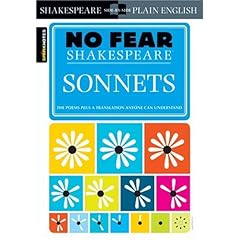 I have a confession to make: I have gone batty for the Bard this month. Over at my blog, I've dedicated the entire month of June to posts for what I've dubbed "Brush Up Your Shakespeare Month." It should therefore come as no surprise to you that I'm talking about Shakespeare here as well. Specifically, I'm talking about Shakespeare's sonnets.
I have a confession to make: I have gone batty for the Bard this month. Over at my blog, I've dedicated the entire month of June to posts for what I've dubbed "Brush Up Your Shakespeare Month." It should therefore come as no surprise to you that I'm talking about Shakespeare here as well. Specifically, I'm talking about Shakespeare's sonnets.If you head to Barnes & Noble or to any number of online book sources, you can purchase your own copy of the No Fear Shakespeare SONNETS: The Poems Plus a Translation Anyone Can Understand. The book contains all 154 of Shakespeare's Sonnets. In each case, the actual text as written by Shakespeare is located on the left-hand page of the book, and the updated translation is on the right-hand side of the page.
Here's an example, using one of the most-recognized sonnets in the collection, Sonnet #18 ("Shall I compare thee to a summer's day?")
First, the original:
Shall I compare thee to a summer's day?
Thou art more lovely and more temperate:
Rough winds do shake the darling buds of May,
And summer's lease hath all too short a date:
Sometime too hot the eye of heaven shines,
And often is his gold complexion dimmed,
And every fair from fair sometime declines,
By chance, or nature's changing course untrimmed:
But thy eternal summer shall not fade
Nor lose possession of that fair thou ow'st,
Nor shall death brag thou wanderest in his shade,
When in eternal lines to time thou grow'st:
So long as men can breathe, or eyes can see,
So long lives this, and this gives life to thee.
 The No Fear version:
The No Fear version:Shall I compare you to a summer day? You're lovelier and milder. Rough winds shake the pretty buds of May, and summer doesn't last nearly long enough. Sometimes the sun shines too hot, and often its golden face is darkened by clouds. And everything beautiful stops being beautiful, either by accident or simply in the course of nature. But your eternal summer will never fade, nor will you lose possession of your beauty, nor shall death brag that you are wandering in the underworld, once you're captured in my eternal verses. As long as men are alive and have eyes with which to see, this poem will live and keep you alive.
As you can see, the No Fear version is not kept in verse; it does, however, render Shakespeare's poem in terms that are simpler to understand than some of Shakespeare's words. Highly recommended for anyone studying the sonnets who isn't comfortable with Elizabethan English.

No comments :
Post a Comment